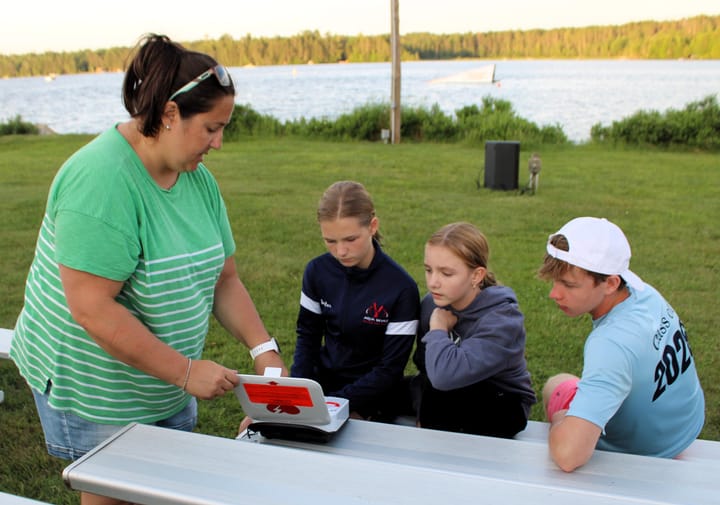Experts Urge Caution After Weasel Rescue Ends Tragically
A well-meaning attempt to rescue a litter of baby weasels took a troubling turn earlier this summer, when an area homeowner was bitten multiple times. Because the animals can carry rabies, the incident triggered an official investigation, ultimately requiring all seven kits to be euthanized for testing.
As more human-wildlife encounters occur, rehabilitators and health officials remind the public that wild animals can carry rabies, a serious disease for which there is no cure. Beyond harming people, encounters with species that commonly carry rabies can also have devastating effects on the animals themselves.
Health departments are required under state statute 95.21 "Rabies control program" to prevent and control the spread of the rabies virus.
According to the Oneida County Health Department, rabies is a viral disease that affects the central nervous system and is typically transmitted through a bite from an infected animal. Rabies is considered fatal if contracted. Symptoms of rabies include irritability, headache, fever, double vision, itching or pain at the bite site. Later symptoms include spasms of the throat, convulsions, delirium, paralysis and death.
The Vilas County Public Health Department says rabies is a disease caused by a virus found in the saliva of infected mammals. It is spread to other animals and people by bites, possibly by getting into an open cut or scratch with saliva. Because there is no cure, treatment is very important for a person who is or may be ill.
In Wisconsin, skunks and bats are the most common animals to carry rabies. However, it has occurred in dogs, cats, foxes, raccoons and livestock. Animals that are carrying rabies do not always display noticeable symptoms of the disease, making it more difficult to detect.
A recent encounter shared by Mark Naniot of Wild Instincts in Rhinelander highlighted how even what seem like innocent encounters can harm everyone involved, even if people are just trying to help by sharing an encounter that went very wrong earlier this summer.
According to Naniot, a person went into their basement and discovered a litter of seven baby weasels that were cold and lethargic. They picked them up, put them in a box and brought the babies upstairs where they were warmed up with a heating pad. After feeding the kits with goat milk and then kitten milk, the person called Wild Instincts for advice.
Upon questioning, Naniot and staff learned the weasels were old enough to be weaned and should not be bottle-fed, then asked if any members of the family had been bitten by the kits. The person replied "many times," indicating that one of the bites had broken the skin. Since all the babies looked so similar, they were unsure which one had drawn blood.
"And that's when the knot in my stomach tightened," Naniot said. "What could have been a wonderful, straight-forward 'save the orphans' call took a hard turn."
He explained that mammals can carry rabies, and any bite that occurs from a wild mammal has to go through the county health department, which is the agency that makes the decisions on what happens next. After conversations back and forth between Wild Instincts, the county health department, and state health officials, it was decided that all seven baby weasels would have to undergo rabies testing.
"Now for those of you who don't know, the only way to test for rabies is looking at brain tissue," Naniot said. "All seven baby weasels the person worked so hard to save are now sacrificing their lives."
Naniot underlined the fact that Wild Instincts answers their its phone 24/7 "so things like this don’t happen."
"Even when you have some background in farming, vet tech, nursing, etc. please, call us first. Even when you think you are doing the right thing and it seems to be helping, situations with wildlife can go sideways very quickly. Call us first to help prevent that," Naniot pleaded.
Health Department Rabies Protocols
The Vilas County Public Health Department works with local veterinarians, law enforcement, health care providers, the State Lab of Hygiene, the victim of an animal bite, and animal owner, to complete follow-up on all reported animal bites.
This includes observing and testing the biting animal and possible treatment of the victim. In most cases, observation or testing of the biting animal will rule out the possibility of rabies. The department notes that all dog, cat, or ferret bites must be reported to law enforcement at 715-479-4441 so a proper report can be completed and follow-up can be initiated.
The Vilas County Humane Officer is responsible for laws related to rabies control and enforcing other animal related laws. For any other complaints about dogs, contact an Animal Control Officer.
If a person is bitten by a suspected rabid animal or wild animal, Vilas' health department recommends washing the wound immediately with soap and running water for at least five minutes, and seeking medical help immediately, even if wounds seem minor.
"If a dog, cat, or ferret bites, immediately confine the pet and contact your veterinarian or local law enforcement," the department says. "If the bite is from a wild or stray animal, do not try to capture the animal unless you are sure you can do so without getting injured. Do not kill the animal that has bitten a human or other animal. Contact local law enforcement or the health department." If the animal that did the biting dies, health officials say to refrigerate, but avoid freezing, the body.
If the animal that is thought to have rabies cannot be observed or tested, or if it tests positive for rabies, the person gets treated immediately with rabies immune globulin and the vaccine series (vaccine injections are given in the arm), according to the department. For more guidance, contact law enforcement, your medical provider, or the health department at 715-479-3656.
In the case of wild animal encounters that break the skin, Oneida County Health Department recommends following the protocols outlined by Vilas County above. It also says to contact Wild Instincts in Rhinelander or Northwoods Wildlife Center in Minocqua for wild animals that may need help, or your local humane society for domestic pets in need of help.



